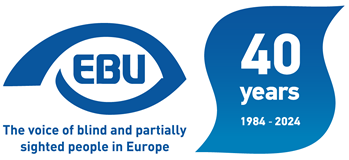On the road to employment
This was the name of the EU funded project which came into action in 2012 and finished in 2015 run by the Lithuanian Association of the Blind and Visually Handicapped (LASS).
Why did we choose to work on such a big and quite challenging project? Everybody knows about great bureaucracy which inevitably accompanies EU funded projects. There were many reasons to say ‘no', even in the planning stage. In order to win the bid, at least 20% of blind and partially sighted persons had to be recruited from small towns and distant regions, 27% of project participants after finishing the project had to find employment or start some kind of studies. The aim of the project was to improve access to employment for visually impaired people.
Lots of effort was made during the past ten years to promote employment of visually impaired people in Lithuania and the results sometimes were quite annoying. The main factors restricting employment opportunities for people with visual disabilities are known and more or less are the same in many countries: a sceptical approach towards the employability of people with visual disabilities, lack of quality education, the low self-confidence and expectations of blind people themselves, poor transport services and in the case of Lithuania, a lack of rehabilitation services. The employment rate of visually impaired people in Lithuania is about 36%. It is not a very bad result, but we must keep in mind that LASS still has 4 social enterprises and quite a number of blind and partially sighted people are employed by the organization itself. A short survey on the economic activity and employment of the members of the Lithuanian association of the blind was carried out several years ago and the results revealed that quite a large number of visually impaired people did not have any motivation to work. There may be a number of different reasons behind this phenomenon; long term unemployment, low salaries, benefits traps. So, the project was targeted mainly at this group of people, trying to motivate them to participate in the labour market. 87 blind and partially sighted people from 8 regions of Lithuania were invited to participate in the project. 79 successfully reached the finish line. Keeping in mind that the project lasted for three years, it is a very good result. 20 blind and partially sighted people started employment and 6 young people entered colleges.
During the three years all participants received about 300 hours of individual training (orientation and mobility, everyday life skills, computer training, individual social consulting, teaching to use special aids etc.) and about 200 hours of group training. All training, individual or group, was done by experienced lecturers. Initially, the project was designed to run for 2,5 years, but later it was prolonged for another 6 months. Because of rapid developments in technology, it was very difficult to plan all activities and training sessions in a very accurate and reasonable way.
It is important to stress that all project participants had a chance to participate in the apprenticeship course. Interestingly, all participants wanted to do the apprenticeship only in our organization's social enterprises and refused to go to other enterprises though all support was guaranteed.
If we analyse the results reached, we can definitely say that the project, though quite complicated, was very useful. All project participants declared that they were happy to be together, they were pleased to have received adequate training and all the support they needed. Though only 20 were successfully employed, mostly in LASS social enterprises, many others put a lot of effort in to searching for jobs. It is obvious, that without social enterprises we would never have reached the results obtained, and may be would never even have started the project. The reality is that our society is not ready to welcome blind people to the labour market. Not yet.
Lithuania is criticized for having social enterprises for disabled people but for the moment, there is nothing better to suggest.
Audra Jozenaite, Project leader

